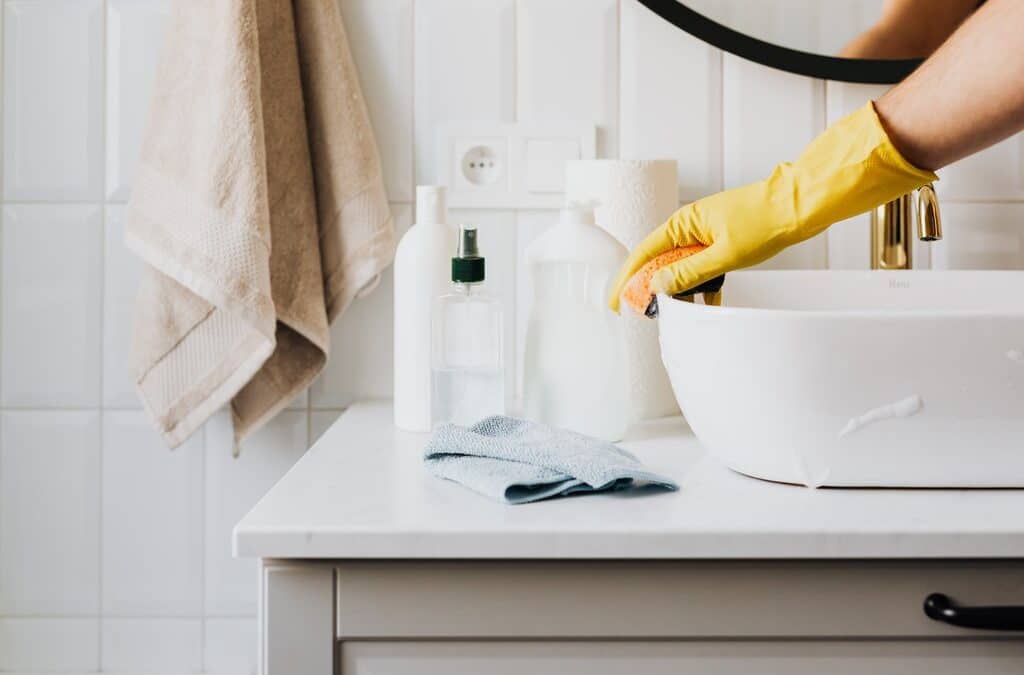Did you know that the COVID-19 virus can remain infectious on hard surfaces for six days? Although the chances of catching an infection from touching a surface are low, it can still happen. As such, it’s important to stay vigilant with proper cleaning and disinfecting methods. To help get you started, read on for your guide on how to clean and disinfect specific surface types—from glass to plastic, stainless steel, and more.
Or, leave the professional cleaning to our team at 360clean! To learn more about our cleaning services and certified cleaning program, contact us today for a free, no-obligation quote.
Glass Surfaces
When cleaning glass, avoid unsightly streaks and smudges by first dusting the surface. To do this, wipe the glass lightly with a damp cloth. Then, use a glass cleaner to disinfect. If you are doing this without the help of a professional, it’s wise to avoid synthetic chemicals, like ammonia, which can be harsh on the skin. Instead, opt for a natural window glass cleaner. To do so, combine ¼ cup of white vinegar with ½ teaspoon of liquid dish soap, and dilute the solution with two cups of water. Shake the bottle vigorously to mix the components!
High-Traffic Areas
High-traffic areas should always be given special attention. These places include sinks, toilets, doorknobs, and frequently used walkways. Since you have more visitors in these places, remove and kill germs here regularly to lessen the chances of anyone getting sick. Keep in mind that it is ideal to spend a considerable amount of time cleaning and disinfecting these areas. However, if you’re in a time crunch, doing something quickly is better than not doing anything at all!
For speed cleaning high-traffic areas, consider cleaning with a homemade solution of soap, hot water, and vinegar to remove dirt and kill some germs. This cleaner/disinfectant can be good for speed-cleaning because it combines the two steps of both cleaning and disinfecting. This solution is safe for most kitchen countertops and bathroom surfaces.
Soap Scum and Hard Water Stains
If you’re combatting soap or hard water stains, try using a natural cleaning solution of vinegar and lemon diluted with water. This combination is fairly easy to make as a DIY cleaner. These cleaners are very acidic and are ideal for use on the following:
- Grease
- Hard water stains
- Soap scum
- Shower heads
- Tile
Be wary of using acidic cleaners—anything with a PH level below 7 which typically includes cleaners/disinfectants made with vinegar/citric acid—on any natural stone surface, such as granite, limestone, or marble. The acid will dull the appearance and render it much less vibrant. For this same reason, highly acidic cleaners should not be used on wood surfaces or knives.
Countertops and Tile
All-purpose cleaners are usually the way to go when it comes to cleaning countertops and tile. They are usually available in liquid or powder forms and can be diluted with water if their full strength is not needed. In addition to these two surfaces, all-purpose cleaners work well with the following surfaces:
- Range hoods
- Laminate flooring
- Linoleum flooring
- Whiteboards
- Non–stainless steel appliances
If you are unsure whether an all-purpose cleaner is safe for use on a particular surface, consult the label. Manufacturers will usually list what types of surfaces their products can and cannot be used with. For example, most all-purpose cleaners should not be used on hardwood floors.
Sometimes the label isn’t clear, or you might not be sure what type of surface you are cleaning. In that case, apply a small amount of the cleaner to a hidden area, then wait an hour or so. If you don’t see fading, discoloration, or other damage to the surface, the cleaner should be safe to use.
Stainless Steel
If you need to clean stainless steel, you might need to find a specialty cleaner. A stainless steel cleaner won’t leave undesirable streaks like an all-purpose cleaner will.
Hard Surfaces
For stained, hard surfaces, few things are better than chlorine bleach. If you are cleaning a sink, tub, or toilet bowl, bleach can be a very effective disinfectant.
When using chlorine bleach, be extremely careful to use proper ventilation and personal protective equipment. Wear gloves to protect your hands, and open the windows, if possible. Never mix bleach solutions with ammonia or other cleaners, as this could create a toxic, deadly gas.
360clean Is Here to Help
Cleaning a facility on your own can be an overwhelming task, and that’s why our team at 360clean is here to help! To ensure the job is done correctly, consider partnering with a professional cleaning service. To learn more about our certified cleaning programs and commercial cleaning services, contact us today for a free quote!

